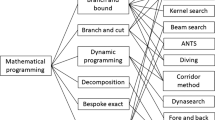Abstract
My research focuses on combinatorial search and optimization. I am particularly interested in trying to outline general principles that would be of use to practitioners who are confronting a new optimization problem. What are the important characteristics of the problem that will determine which algorithm performs best? My intuition is that the most important questions one should ask about a new problem concern the available sources of heuristic information. It is a truism in AI that knowledge reduces search. Following this line of thinking, I have been focusing on how best to exploit sources of heuristic information.
Similar content being viewed by others
References
Ruml, Wheeler. 2001a. Incomplete tree search using adaptive probing. In Proceedings of IJCAI-01, pages 235–241.
Ruml, Wheeler. 2001b. Stochastic tree search: Where to put the randomness? In Holger H. Hoos and Thomas G. Stützle, editors, Proceedings of the IJCAI-01 Workshop on Stochastic Search, pages 43–47.
Ruml, Wheeler. 2001c. Using prior knowledge with adaptive probing. In Carla Gomes and Toby Walsh, editors, Proceedings of the 2001 AAAI Fall Symposium on Using Uncertainity Within Computation, pages 116–120. AAAI Technical Report FS-01-04.
Ruml, Wheeler. 2002. Heuristic search in bounded-depth trees: Best-leaf-first search. Technical Report TR-01-02, Harvard University, Cambridge, MA, January.
Ruml, Wheeler. in preparation. Adaptive Tree Search. Ph.D. thesis, Harvard University.
Ruml, Wheeler. to appear. Constructing distributed representations using additive clustering. In Advances in Neural Information Processing Systems 14 (NIPS-01). MIT Press.
Author information
Authors and Affiliations
Editor information
Editors and Affiliations
Rights and permissions
Copyright information
© 2002 Springer-Verlag Berlin Heidelberg
About this paper
Cite this paper
Ruml, W. (2002). Principled Exploitation of Heuristic Information. In: Koenig, S., Holte, R.C. (eds) Abstraction, Reformulation, and Approximation. SARA 2002. Lecture Notes in Computer Science(), vol 2371. Springer, Berlin, Heidelberg. https://doi.org/10.1007/3-540-45622-8_38
Download citation
DOI: https://doi.org/10.1007/3-540-45622-8_38
Published:
Publisher Name: Springer, Berlin, Heidelberg
Print ISBN: 978-3-540-43941-7
Online ISBN: 978-3-540-45622-3
eBook Packages: Springer Book Archive




